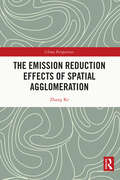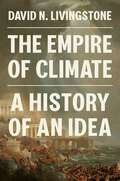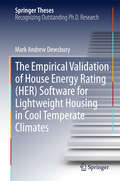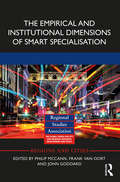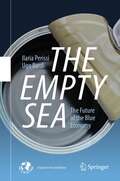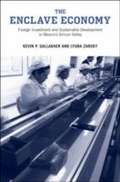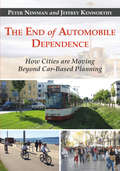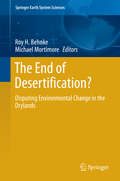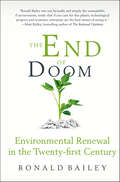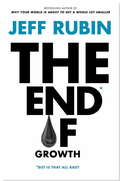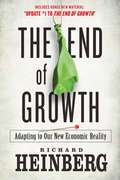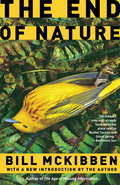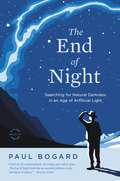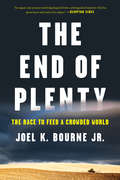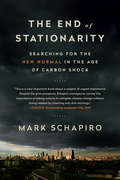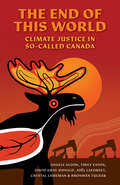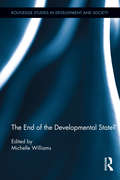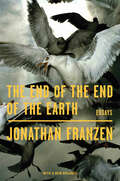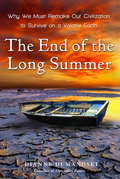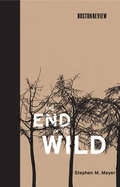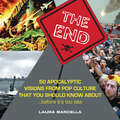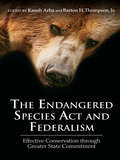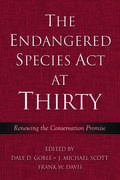- Table View
- List View
The Emission Reduction Effects of Spatial Agglomeration (China Perspectives)
by Zhang KeThe book studies the relationship between economic agglomeration and environmental pollution from a spatial perspective through theoretical analyses and empirical discussions.At both microscopic and macroscopic levels, the author first explores the impact mechanism of the agglomeration of economic activities on environmental pollution and proposes research frameworks based on spatial economic theory and output density theory. Drawing on descriptive statistics and explorative spatial data from 283 cities in China, the book investigates the current development, spatial characteristics, influence path, and environmental efficiency of urban economic agglomeration and pollution in the People’s Republic. The following empirical sections study spatial spillover effects, simultaneous bias and spatial interaction between agglomeration and pollution. The research findings give insight into interregional economic development, joint pollution control across regions, and the coordination of the two, especially in the context of developing countries.The title will appeal to researchers, students, government officials and policymakers interested in development economics, regional economics, urban economics, and environmental economics.
The Empire of Climate: A History of an Idea
by David N. LivingstoneHow the specter of climate has been used to explain history since antiquityScientists, journalists, and politicians increasingly tell us that human impacts on climate constitute the single greatest threat facing our planet and may even bring about the extinction of our species. Yet behind these anxieties lies an older, much deeper fear about the power that climate exerts over us. The Empire of Climate traces the history of this idea and its pervasive influence over how we interpret world events and make sense of the human condition, from the rise and fall of ancient civilizations to the afflictions of the modern psyche.Taking readers from the time of Hippocrates to the unfolding crisis of global warming today, David Livingstone reveals how climate has been critically implicated in the politics of imperial control and race relations; been used to explain industrial development, market performance, and economic breakdown; and served as a bellwether for national character and cultural collapse. He examines how climate has been put forward as an explanation for warfare and civil conflict, and how it has been identified as a critical factor in bodily disorders and acute psychosis.A panoramic work of scholarship, The Empire of Climate maps the tangled histories of an idea that has haunted our collective imagination for centuries, shedding critical light on the notion that everything from the wealth of nations to the human mind itself is subject to climate&’s imperial rule.
The Empirical Validation of House Energy Rating (HER) Software for Lightweight Housing in Cool Temperate Climates
by Mark Andrew DewsburyThis book reports on the first empirical validation of "AccuRate," Australia's national benchmark software tool for house energy ratings. The validation was conducted by the University of Tasmania in collaboration with Forest and Wood Products Australia, the Australian Government, the CSIRO and industry partners. The study presented here describes the results of graphical and statistical analysis of variations observed between the measured and simulated data from three different test buildings in Launceston, Tasmania. It shows that, while the AccuRate software is well suited to modeling energy flows, there are discrepancies between the simulated and measured temperatures of the test buildings. Moreover, it highlights possible connections between the discrepancies in all zones and the outside air temperature, wind speed, global and diffuse solar radiation, and possibly the ground model. Beyond its contribution to further investigations into the ongoing improvement and calibration of the Australian NatHERS-supported AccuRate software, this book also meticulously describes the methodology used in conducting the research, which is expected to pave the way for further studies of this type.
The Empirical and Institutional Dimensions of Smart Specialisation (Regions and Cities)
by John Goddard Philip McCann Frank Van OortSmart specialisation is the new policy approach to the development of regional innovation systems across Europe and it involves fostering innovative and entrepreneurial initiatives which are well tailored to the local context. The different technologies, skills profiles, business activities, institutions and sectors which reflect a region’s economic strengths and potential are to be fostered and encouraged to diversify in ways which also exploit the region’s linkages with broader global value-chains.Yet, the ideas contained in the smart specialisation agenda have until now been primarily conceptual in nature. The Empirical and Institutional Dimensions of Smart Specialisation draws together some of the leading regional economists and scientists in Europe to analyse how smart specialisation is working in practice. This book investigates different dimensions of the agenda as it is developing across parts of Europe from both quantitative and qualitative perspectives. The quantitative analysis examines the nature of the diversification processes undertaken by regions and the interplay between the chosen local regional development priorities and the wider global value-chain impacts of these choices. Meanwhile, the qualitative analysis examines the institutional opportunities and challenges facing policy makers and the key elements most likely to provide the underpinnings of a workable set of policy settings.The book is aimed both at academic researchers interested in the interface between economic geography and regional innovation systems as well as at policy makers making public policy decisions related to regional development at the local, city, regional or national levels.
The Empty Sea: The Future of the Blue Economy
by Ugo Bardi Ilaria PerissiThe “Blue Economy” is used to describe all of the economic activities related to the sea, with a special emphasis on sustainability. Traditional activities such as fisheries, but also undersea mining, tourism, and scientific research are included, as well as the phenomenal growth of aquaculture during the past decade. All of these activities, and the irresistible prospect of another new frontier, has led to enthusiastic and, most likely, overenthusiastic assessments of the possibilities to exploit the sea to feed the world, provide low-cost energy, become a new source of minerals, and other future miracles. This book makes sense of these trends and of the future of the blue economy by following our remote ancestors who gradually discovered the sea and its resources, describing the so-called fisherman’s curse – or why fishermen have always been poor, explaining why humans tend to destroy the resources on which we depend, and assessing the realistic expectations for extracting resources from the sea. Although the sea is not so badly overexploited as the land, our demands on ecosystem services are already above the oceans’ sustainability limits. Some new ideas, including “fishing down” for untapped resources such as plankton, could lead to the collapse of the entire marine ecosystem. How Neanderthals crossed the sea in canoes, how it was possible for five men on a small boat to kill a giant whale, what kind of oil the virgins of the Gospel put into their lamps, how a professor of mathematics, Vito Volterra, discovered the “equations of fishing,” why it has become so easy to be stung by a jellyfish while swimming in the sea, and how to play “Moby Dick,” a simple board game that simulates the overexploitation of natural resources are just some of the questions that you will be able to answer after reading this engaging and insightful book about the rapidly expanding relationship between humanity and the sea.
The Enclave Economy: Foreign Investment and Sustainable Development in Mexico's Silicon Valley
by Lyuba Zarsky Kevin P. GallagherForeign investment has been widely perceived as a panacea for developing countries--as a way to reduce poverty and jump-start sustainable modern industries. In The Enclave Economy,Kevin Gallagher and Lyuba Zarsky call this prescription into question, showing that Mexico's post-NAFTA experience of foreign direct investment in its information technology sector, particularly in the Guadalajara region, did not result in the expected benefits. Charting the rise and fall of Mexico's "Silicon Valley," they explore issues that resonate through much of Latin America and the developing world: the social, economic, and environmental effects of market-driven globalization. In the 1990s, Mexico was a poster child for globalization, throwing open its borders to trade and foreign investment, embracing NAFTA, and ending the government's role in strengthening domestic industry. But The Enclave Economyshows that although Mexico was initially successful in attracting multinational corporations, foreign investments waned in the absence of active government support and because China became increasingly competitive. Moreover, foreign investment created an "enclave economy" the benefits of which were confined to an international sector not connected to the wider Mexican economy. In fact, foreign investment put many local IT firms out of business and transferred only limited amounts of environmentally sound technology. Gallagher and Zarsky suggest policies and strategies that will enable Mexico and other developing countries to foster foreign investment for sustainable development in the future.
The End of Automobile Dependence
by Jeffrey Kenworthy Peter NewmanCities will continue to accommodate the automobile, but when cities are built around them, the quality of human and natural life declines. Current trends show great promise for future urban mobility systems that enable freedom and connection, but not dependence. We are experiencing the phenomenon of peak car use in many global cities at the same time that urban rail is thriving, central cities are revitalizing, and suburban sprawl is reversing. Walking and cycling are growing in many cities, along with ubiquitous bike sharing schemes, which have contributed to new investment and vitality in central cities including Melbourne, Seattle, Chicago, and New York. We are thus in a new era that has come much faster than global transportation experts Peter Newman and Jeffrey Kenworthy had predicted: the end of automobile dependence. In The End of Automobile Dependence, Newman and Kenworthy look at how we can accelerate a planning approach to designing urban environments that can function reliably and conveniently on alternative modes, with a refined and more civilized automobile playing a very much reduced and manageable role in urban transportation. The authors examine the rise and fall of automobile dependence using updated data on 44 global cities to better understand how to facilitate and guide cities to the most productive and sustainable outcomes. This is the final volume in a trilogy by Newman and Kenworthy on automobile dependence (Cities and Automobile Dependence in 1989 and Sustainability and Cities: Overcoming Automobile Dependence in 1999). Like all good trilogies this one shows the rise of an empire, in this case that of the automobile, the peak of its power, and the decline of that empire.
The End of Desertification?
by Roy Behnke Michael MortimoreThe question in the title of this book draws attention to the shortcomings of a concept that has become a political tool of global importance even as the scientific basis for its use grows weaker. The concept of desertification, it can be argued, has ceased to be analytically useful and distorts our understanding of social-environmental systems and their resiliency, particularly in poor countries with variable rainfall and persistent poverty. For better policy and governance, we need to reconsider the scientific justification for international attempts to combat desertification. Our exploration of these issues begins in the Sahel of West Africa, where a series of severe droughts at the end of the 20th century led to the global institutionalization of the idea of desertification. It now seems incontrovertible that these droughts were not caused primarily by local land use mismanagement, effectively terminating a long-standing policy and scientific debate. There is now an opportunity to treat this episode as an object lesson in the relationship between science, the formation of public opinion and international policy-making. Looking beyond the Sahel, the chapters in this book provide case studies from around the world that examine the use and relevance of the desertification concept. Despite an increasingly sophisticated understanding of dryland environments and societies, the uses now being made of the desertification concept in parts of Asia exhibit many of the shortcomings of earlier work done in Africa. It took scientists more than three decades to transform a perceived desertification crisis in the Sahel into a non-event. This book is an effort to critically examine that experience and accelerate the learning process in other parts of the world.
The End of Doom: Environmental Renewal in the Twenty-first Century
by Ronald BaileyIn the past five decades there have been many, many forecasts of impending environmental doom. They have universally been proven wrong. Meanwhile, those who have bet on human resourcefulness have almost always been correct. In his widely praised book Ecoscam, Ronald Bailey strongly countered environmentalist alarmism, using facts to demonstrate just how wildly overstated many claims of impending ecological doom really were. Now, twenty years later, the Reason Magazine science correspondent is back to assess the future of humanity and the global biosphere. Bailey finds, contrary to popular belief, that many present ecological trends are quite positive. Including: Falling cancer incidence rates in the United States. The likelihood of a declining world population by mid-century. The abundant return of agricultural land to nature as the world reaches peak farmland. A proven link between increases in national wealth and reductions in air and water pollution Global warming is a problem, but the cost of clean energy could soon fall below that of fossil fuels.In The End of Doom, Bailey avoids polemics and offers a balanced, fact-based and ultimately hopeful perspective on our current environmental situation. Now isn't that a breath of fresh air?
The End of Growth
by Jeff RubinIn an urgent follow-up to his best-selling Why Your World Is About To Get A Whole Lot Smaller, Jeff Rubin argues that the end of cheap oil means the end of growth. What it will be like to live in a world where growth is over? Economist and resource analyst Jeff Rubin is certain that the world's governments are getting it wrong. Instead of moving us toward economic recovery, measures being taken around the globe right now are digging us into a deeper hole. Both politicians and economists are missing the fact that the real engine of economic growth has always been cheap, abundant fuel and resources. But that era is over. The end of cheap oil, Rubin argues, signals the end of growth--and the end of easy answers to renewing prosperity. Rubin's own equation is clear: with China and India sucking up the lion's share of the world's ever more limited resources, the rest of us will have to make do with less. But is this all bad? Can less actually be more? Rubin points out that there is no research to show that people living in countries with hard-charging economies are happier, and plenty of research to show that some of the most contented people on the planet live in places with no-growth or slow-growth GDPs. But it doesn't matter whether it's bad or good, it's the new reality: our world is not only about to get smaller, our day-to-day lives are about to be a whole lot different.
The End of Growth
by Richard HeinbergThis special, updated ebook edition includes new bonus material.Economists insist that recovery is at hand, yet unemployment remains high, real estate values continue to sink, and governments stagger under record deficits. The End of Growth proposes a startling diagnosis: humanity has reached a fundamental turning point in its economic history. The expansionary trajectory of industrial civilization is colliding with non-negotiable natural limits.Richard Heinberg's latest landmark work goes to the heart of the ongoing financial crisis, explaining how and why it occurred, and what we must do to avert the worst potential outcomes. Written in an engaging, highly readable style, it shows why growth is being blocked by three factors:--Resource depletion--Environmental impacts--Crushing levels of debtThese converging limits will force us to re-evaluate cherished economic theories and to reinvent money and commerce.The End of Growth describes what policy makers, communities, and families can do to build a new economy that operates within Earth's budget of energy and resources. We can thrive during the transition if we set goals that promote human and environmental well-being, rather than continuing to pursue the now-unattainable prize of ever-expanding GDP.Richard Heinberg is the author of nine previous books, including The Party's Over, Peak Everything, and Blackout. A senior fellow of the Post Carbon Institute, Heinberg is one of the world's foremost peak oil educators and an effective communicator of the urgent need to transition away from fossil fuels.
The End of Nature
by Bill MckibbenReissued on the tenth anniversary of its publication, this classic work on our environmental crisis features a new introduction by the author, reviewing both the progress and ground lost in the fight to save the earth.This impassioned plea for radical and life-renewing change is today still considered a groundbreaking work in environmental studies. McKibben's argument that the survival of the globe is dependent on a fundamental, philosophical shift in the way we relate to nature is more relevant than ever. McKibben writes of our earth's environmental cataclysm, addressing such core issues as the greenhouse effect, acid rain, and the depletion of the ozone layer. His new introduction addresses some of the latest environmental issues that have risen during the 1990s. The book also includes an invaluable new appendix of facts and figures that surveys the progress of the environmental movement.More than simply a handbook for survival or a doomsday catalog of scientific prediction, this classic, soulful lament on Nature is required reading for nature enthusiasts, activists, and concerned citizens alike.
The End of Night: Searching for Natural Darkness in an Age of Artificial Light
by Paul BogardA deeply panoramic tour of the night, from its brightest spots to the darkest skies we have left. A starry night is one of nature's most magical wonders. Yet in our artificially lit world, three-quarters of Americans' eyes never switch to night vision and most of us no longer experience true darkness. In THE END OF NIGHT, Paul Bogard restores our awareness of the spectacularly primal, wildly dark night sky and how it has influenced the human experience across everything from science to art. From Las Vegas' Luxor Beam--the brightest single spot on this planet--to nights so starlit the sky looks like snow, Bogard blends personal narrative, natural history, science, and history to shed light on the importance of darkness--what we've lost, what we still have, and what we might regain--and the simple ways we can reduce the brightness of our nights tonight.
The End of Plenty: The Race to Feed a Crowded World
by Joel K. Bourne JrAn award-winning environmental journalist introduces a new generation of farmers and scientists on the frontlines of the next green revolution. When the demographer Robert Malthus (1766-1834) famously outlined the brutal relationship between food and population, he never imagined the success of modern scientific agriculture. In the mid-twentieth century, an unprecedented agricultural advancement known as the Green Revolution brought hybrid seeds, chemical fertilizers, and improved irrigation that drove the greatest population boom in history--but left ecological devastation in its wake. In The End of Plenty, award-winning environmental journalist Joel K. Bourne Jr. puts our race to feed the world in dramatic perspective. With a skyrocketing world population and tightening global grain supplies spurring riots and revolutions, humanity must produce as much food in the next four decades as it has since the beginning of civilization to avoid a Malthusian catastrophe. Yet climate change could render half our farmland useless by century's end. Writing with an agronomist's eye for practical solutions and a journalist's keen sense of character, detail, and the natural world, Bourne takes readers from his family farm to international agricultural hotspots to introduce the new generation of farmers and scientists engaged in the greatest challenge humanity has ever faced. He discovers young, corporate cowboys trying to revive Ukraine as Europe's breadbasket, a Canadian aquaculturist channeling ancient Chinese traditions, the visionary behind the world's largest organic sugar-cane plantation, and many other extraordinary individuals struggling to increase food supplies--quickly and sustainably--as droughts, floods, and heat waves hammer crops around the globe. Part history, part reportage and advocacy, The End of Plenty is a panoramic account of the future of food, and a clarion call for anyone concerned about our planet and its people.
The End of Stationarity: Searching for the New Normal in the Age of Carbon Shock
by Mark SchapiroScientists have devised a new term to explain the turmoil caused by climate change: the end of stationarity. It means that our baselines for rainfall, water flow, temperature, and extreme weather are no longer relevant--that making predictions based on past experience is no longer possible. But climate change has upended baselines in the financial world, too, disrupting the global economy in ways that are just becoming clear, leaving us unable to assess risk, and causing us to fundamentally re-think economic priorities and existing business models. At the heart of that financial unrest is the role of carbon, and as the world moves toward making more and more polluters pay to emit it, a financial mystery unfolds: What are the costs? Who has the responsibility to pay for them? Who do you pay? How do you pay? And how will those costs ripple through the economy? These are the questions veteran journalist Mark Schapiro attempts to answer as he illuminates the struggle to pinpoint carbon's true costs and allocate them fairly--all while bumping up against the vagaries of the free market, the lobbying power of corporations, the political maneuverings of countries, and the tolerance of everyday consumers buying a cup of coffee, a tank of gas, or an airplane ticket. Along the way, Schapiro tracks the cost of carbon through the drought-ridden farmland of California, the jungles of Brazil, the world's greatest manufacturing center in China, the carbon-trading center of Europe, and the high-tech crime world that carbon markets have inspired. He even tracks the cost of carbon through the skies themselves, where efforts to put a price tag on the carbon left by airplanes in the no-man's land of the atmosphere created what amounted to a quiet but powerful global trade war. The End of Stationarity deftly depicts the wild, new carbon economy, and shows us how nations, emerging and developed, teeter on its brink. Originally published in hardcover as Carbon Shock, the book is updated throughout and includes a new afterword, based on the Paris climate talks.
The End of This World: Climate Justice in So-Called Canada
by Emily Eaton Angele Alook David Gray-Donald Joël Laforest Crystal Lameman Bronwen TuckerThe climate crisis is here, and the end of this world—a world built on land theft, resource extraction, and colonial genocide—is on the horizon. In this compelling roadmap to a livable future, Indigenous sovereignty and climate justice go hand in hand. Drawing on their work in Indigenous activism, the labour movement, youth climate campaigns, community-engaged scholarship, and independent journalism, the six authors challenge toothless proposals and false solutions to show that a just transition from fossil fuels cannot succeed without the dismantling of settler capitalism in Canada. Together, they envision a near future where oil and gas stay in the ground; where a caring economy provides social supports for all; where wealth is redistributed from the bloated billionaire class; and where stolen land is rightfully reclaimed under the jurisdiction and sovereignty of Indigenous peoples. Packed with clear-eyed analysis of both short- and long-term strategies for radical social change, The End of This World promises that the next world is within reach and worth fighting for.
The End of the Developmental State?: End Of The Developmental State? (Routledge Studies in Development and Society)
by Michelle WilliamsThe End of the Developmental State? brings together leading scholars of development to assess the current status of the "developmental state" in several developing and transitional economies of South Korea, Taiwan, Ireland, the United Kingdom, China, South Africa, Brazil and India. Has the concept of the developmental state become outmoded? These authors would suggest not. However, they do argue that the historical trajectories of developmental states in Asia, Latin America, Africa and Europe suggest all too clearly that the concept must be re-examined critically and creatively. The range and diversity of their positions and their rejection of stale programmatic positions from the past will revitalize the debate on the role of the state in social and economic transformation in the twenty-first century. By bringing together careful comparative analyses of national cases, in both the Global North and South, the volume highlights pivotal conditions – economic restructuring, domestic politics, epistemic shifts and ecological limits – that are forcing revision of the goals and strategies of developmental states and suggests that states that ignore these new conditions will indeed see the "end of the developmental state".
The End of the End of the Earth: Essays
by Jonathan FranzenFrom Jonathan Franzen, one of our preeminent writers and thinkers, comes a brilliant, searing essay collection that calls for us to take better care of our planet and one another in these troubled times.The End of the End of the Earth is a collection of Jonathan Franzen's essays and speeches from the past five years, in which he grapples with the most important and heated ethical subjects of the day: environmentalism, capitalism, wealth inequality, race, technology and the role of art. He challenges us to ask difficult questions: What is our civic responsibility in the face of climate change, the greatest ever threat to our planet and species? Does technology give us a sense of control or community or is it stripping these from us? Above all, in these essays, Franzen asks us to care--about causes great and small, with subjects as big as our planet and specific as a rare species of birds. These essays are in praise of empathy, and of the beauty and power of nature and art.This slim but powerful book is Franzen at his best, incisive, persuasive and compassionate.
The End of the End of the Earth: Essays
by Jonathan FranzenFrom Jonathan Franzen, one of our preeminent writers and thinkers, comes a brilliant, searing essay collection that calls for us to take better care of our planet and one another in these troubled times.The End of the End of the Earth is a collection of Jonathan Franzen's essays and speeches from the past five years, in which he grapples with the most important and heated ethical subjects of the day: environmentalism, capitalism, wealth inequality, race, technology and the role of art. He challenges us to ask difficult questions: What is our civic responsibility in the face of climate change, the greatest ever threat to our planet and species? Does technology give us a sense of control or community or is it stripping these from us? Above all, in these essays, Franzen asks us to care--about causes great and small, with subjects as big as our planet and specific as a rare species of birds. These essays are in praise of empathy, and of the beauty and power of nature and art.This slim but powerful book is Franzen at his best, incisive, persuasive and compassionate.
The End of the Long Summer: Why We Must Remake Our Civilization to Survive On A Volatile Earth
by Dianne DumanoskiFor the past twelve thousand years, Earth’s stable climate has allowed human civilization to flourish. But this long benign summer is an anomaly in the Earth’s history and one that is rapidly coming to a close. The radical experiment of our modern industrial civilization is now disrupting our planet’s very metabolism; our future hinges in large part on how Earth responds. Climate change is already bearing down, hitting harder and faster than expected. The greatest danger is not extreme yet discrete weather events, such as Hurricane Katrina or the calamitous wildfires that now plague California, but profound and systemic disruptions on a global scale. Contrary to the pervasive belief that climate change will be a gradual escalator ride into balmier temperatures, the Earth’s climate system has a history of radical shifts–dramatic shocks that could lead to the collapse of social and economic systems. The question is no longer simply how can we stop climate change, but how can we as a civilization survive it. The guiding values of modern culture have become dangerously obsolete in this new era. Yet as renowned environmental journalist Dianne Dumanoski shows, little has been done to avert the crisis or to prepare human societies for a time of growing instability. In a work of astonishing scope, Dumanoski deftly weaves history, science, and culture to show how the fundamental doctrines of modern society have impeded our ability to respond to this crisis and have fostered an economic globalization that is only increasing our vulnerability at this critical time. She exposes the fallacy of banking on a last-minute technological fix as well as the perilous trap of believing that humans can succeed in the quest to control nature. Only by restructuring our global civilization based on the principles that have allowed Earth’s life and our ancestors to survive catastrophe——diversity, redundancy, a degree of self-sufficiency, social solidarity, and an aversion to excessive integration——can we restore the flexibility needed to weather the trials ahead. In this powerful and prescient book, Dumanoski moves beyond now-ubiquitous environmental buzzwords about green industries and clean energy to provide a new cultural map through this dangerous passage. Though the message is grave, it is not without hope. Lucid, eloquent, and urgent,The End of the Long Summerdeserves a place alongside transformative works such asSilent SpringandThe Fate of the Earth. From the Hardcover edition.
The End of the Wild
by Stephen M. MeyerToday the guiding hand of natural selection is unmistakably human. With these words Stephen M. Meyer begins a stunningly clear-eyed view of the extinction crisis. Marshaling evidence from the last ten years of research, he argues that nothing-not national or international laws, global bioreserves, local sustainability schemes, or "wildlands"-will change the course we have set: the loss of half of the earth's species by the end of the century. We will come to share the planet only with species that thrive in human-dominated environments.
The End of the Wild (Boston Review)
by Stephen M. MeyerA wake-up call that argues that although it may be too late to save biodiversity, we can take steps to save our ecosystems. With the extinction rate at 3000 species a year and accelerating, we can now predict that as many as half of the Earth's species will disappear within the next 100 years. The species that survive will be the ones that are most compatible with us: the weedy species—from mosquitoes to coyotes—that thrive in continually disturbed human-dominated environments. The End of the Wild is a wake-up call. Marshaling evidence from the last ten years of research on the environment, Stephen Meyer argues that nothing—not national or international laws, global bioreserves, local sustainability schemes, or "wildlands"—will change the course that has been set. Like it or not, we can no longer talk about conserving nature, only managing what is left. The race to save biodiversity is over. But that doesn't mean our work is over. The End of the Wild is also a call to action. Without intervention, the surviving ecosystems we depend on for a range of services—including water purification and flood and storm damage contro—could fail and the global spread of invasive species (pests, parasites, and disease-causing weedy species) could explode. If humanity is to survive, Meyer argues, we have no choice but to try to manage the fine details. We must move away from the current haphazard strategy of protecting species in isolation and create trans-regional "meta-reserves," designed to protect ecosystem functions rather than species-specific habitats.
The End: 50 Apocalyptic Visions From Pop Culture That You Should Know About...Before It's Too Late
by Laura BarcellaPeople have been making predictions about how and when the world is going to end for ages. The End is a fun pop culture read about the top 50 movies, books, songs, and artworks—from the movie Shaun of the Dead to the song It's the End of the World as We Know It—about the apocalypse. Each item includes: - A synopsis of the apocalyptic work - Information about the apocalyptic theory behind it (from alien invasion to meteors, nuclear war, and natural disasters) - An explanation about why this work is important in pop culture Love doomsday talk and the art made about it? Check out this fun and entertaining read!
The Endangered Species Act and Federalism: Effective Conservation through Greater State Commitment
by Jr. Barton H. Thompson Kaush ArhaStates today play a major role in implementing and enforcing environmental laws such as the Clean Air Act, Clean Water Act, and the Resource Conservation and Recovery Act. A thirty year review of ESA identified state leadership in species conservation as a necessary element in better conserving the nation‘s imperiled species, yet the theoretical and practical reasons and applications of an enhanced state role are little understood and have not been subjected to any meaningful analysis. This book, for the first time, presents the legal and policy analysis for federalism considerations in implementing ESA. The book undertakes a comprehensive analysis of the economic rationale for federalism in ESA administration; compares administration of ESA to other major environmental statutes; reviews various tools under the existing Act to enhance state role in species conservation; evaluates major case studies to determine roles the state can play in species conservation and recovery; and concludes with policy recommendations to encourage greater state involvement in species conservation.
The Endangered Species Act at Thirty: Renewing the Conservation Promise
by Dale D. Goble J. Michael Scott Frank W. DavisThe Endangered Species Act at Thirty is a comprehensive, multidisciplinary review of issues surrounding the Endangered Species Act, with a specific focus on the act's actual implementation record over the past thirty years. The result of a unique, multi-year collaboration among stakeholder groups from across the political spectrum, the two volumes offer a dispassionate consideration of a highly polarized topic. Renewing the Conservation Promise, Volume 1, puts the reader in a better position to make informed decisions about future directions in biodiversity conservation by elevating the policy debate from its current state of divisive polemics to a more-constructive analysis. It helps the reader understand how the Endangered Species Act has been implemented, the consequences of that implementation, and how the act could be changed to better serve the needs of both the species it is designed to protect and the people who must live within its mandates. Volume 2, which examines philosophical, biological, and economic dimensions of the act in greater detail, will be published in 2006. As debate over reforming the Endangered Species Act heats up in the coming months, these two books will be essential references for policy analysts and lawmakers; professionals involved with environmental law, science, or management; and academic researchers and students concerned with environmental law, policy, management, or science.
